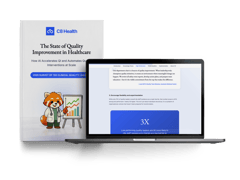
Improving Patient Outcomes Through Instant Access to Best Practices
Happy patients are the best advocates for optimal care. As healthcare shifts towards value-based models, we need to adopt the best practices and technology to improve patient well-being. But old-school content management platforms and closed-off data silos can block access to the latest medical insights that could really make a difference.
We can significantly improve care standards by updating these systems and sharing discoveries promptly and collaboratively. This instant access to best practices can help us all offer better care-let's look at how.
Meet the expert
Mical DeBrow is an accomplished healthcare leader and clinician with extensive expertise spanning pharma, healthcare payers and providers, and healthcare information technology.
How Best Practices Shape Patient Outcomes in Healthcare
Healthcare best practices are proven ways to give patients the highest chance of getting better. These strategies are the "best available evidence" in healthcare, from clinical guidelines and administrative procedures to cutting-edge tech that enhances diagnostics or treatment.
When healthcare teams follow their institution's best practices, they offer more standardized and consistent care and see better patient outcomes.
Staying current with the latest best practices means being ready to deliver top-quality, effective, and cost-efficient patient care. So, healthcare providers need systems that give them instant access to this essential knowledge.
» Want to put these guidelines into action? Check out how to implement best practices for knowledge management
Challenges in Accessing Best Practices
Unfortunately, while there's evidently a need for instant information access, there are also many obstacles to getting your hands on it. Let's look at some of the common challenges to securing this access.
Delays in Sharing Research Findings
The current system for publishing medical research involves a rigorous peer review process. It's great for making sure the research is solid, but it slows discoveries down a lot.
For top academic journals, it usually takes more than a year from when an article is submitted to when it's finally published and reaches clinicians. Plus, the research must be published in high-impact journals first, then slowly into updated guidelines and textbooks. This can take years.
So, patient care often continues based on possibly outdated standards without the benefit of the latest findings. Even when new and improved best practices could lead to better results, the slow publication process gets in the way.
This delay, between evidence to practice, stems from putting reputation before speed, and it's a big challenge in managing healthcare.
Proprietary Health Data Silos
Things get more complex when companies have proprietary arrangements with data sources. This means these databases are exclusive to each company, leading to systems that don't communicate well. The lack of communication between databases creates what we call 'data silos.'
And these data silos make it hard to get a complete understanding of critical patient information. It's like trying to put together a puzzle with pieces missing. This can prevent healthcare professionals from making the best decisions and lead to less-than-ideal patient health outcomes.
These issues are part of broader knowledge access issues in the medical field. Our latest white paper provides an in-depth look at the problem.
» Looking to take make data silos a thing of the past? Check out C8 Health.
3 Ways to Enhance Patient Outcomes
With easy access to information, healthcare providers can offer better patient care. Here are some strategies to improve patient outcomes with robust knowledge management.
1. Improve Access to Locally Vetted Best Practices
It's important to note that while access to research and findings is important, locally vetted best practices are what clinicians trust most and are crucial for improving patient care.
Clinical questions often require a systematic review of the evidence, which can be time-consuming and impractical for healthcare providers. This is why institutions create and vet protocols and best practices that have been proven effective in their specific location.
Access to these locally vetted best practices is what needs to be improved in order to provide clinicians with the guidance they need to make informed decisions and provide the best possible care for their patients.
By making these protocols easily accessible to healthcare providers, institutions can contribute significantly to improved patient management and better patient outcomes.
This is true for Dr.Daniel Katz, Vice Chair of Education at Mount Sinai's Anesthesia Department. He uses C8 Health's platform to share vetted best practices across healthcare teams efficiently.
2. Manage Knowledge Bases Efficiently
Healthcare providers must use the latest advancements in technology and data science to get a complete view of patient information. This can help overcome the problems caused by proprietary data systems and siloed databases.
The aim is to gather information from all sources and make it worthwhile. We want to create a single, reliable source that combines data from different databases.
This way, healthcare providers can access all patient information, regardless of their system.
3. Invest in Advanced Knowledge Management Systems
Advanced knowledge management systems give healthcare professionals immediate access to the latest, locally vetted best practices when and where they need them. This can reduce errors and inconsistencies in care. And it supports faster, better decision-making.
Platforms designed specifically for the healthcare setting enable instant point-of-care access to the latest locally vetted best practices. With this technology, you can curate discoveries and best practices for your teams for quick access from one single source.
Clinical teams receive real-time notifications on updates to best practices as they become available, fostering effective knowledge dissemination.
This agile knowledge distribution pipeline cuts through publication delays, getting vital insights to practice efficiently.
» Want to consolidate your healthcare information? Discover more about knowledge management in healthcare.
Using Technology for Better Information Access
When you invest in technology you trust, it can help you disseminate and access vetted information a lot more efficiently. Locating knowledge across siloed systems is difficult and slow.
A system that delivers vetted and updated information right to your device, whether you're on the move in a hospital or at your desk, means you can make quicker decisions and minimize mistakes. You'll also ensure consistent care, and stay updated on the latest research and advancements. This can ultimately lead to better patient outcomes, improved healthcare quality, and potentially even cost savings.


